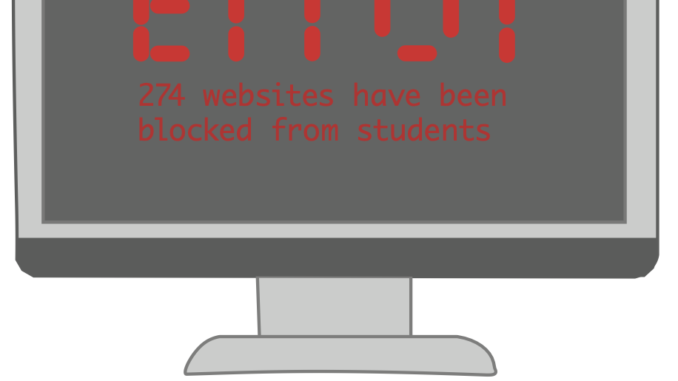
photo credit: Rylee Bokesch
As Olentangy Schools enter the new year, a slew of new policies follows after the implementation of Senate Bill No. 29. While teachers and students have experienced the changes that come from the bill, there is a lack of clarity amongst many about the bill’s extent and impact.
Senate Bill No. 29 is a segment of legislature formed to protect student data privacy by instituting firm guidelines for digital resources in schools. The bill features a list of resources not in compliance with student data privacy; resources on the list include sites like Khan Academy, Google Classroom, Flipgrid (Flip) and Duolingo.
The bill also features a list of both approved sites and pending resources. Websites like Kahoot, Canva and College Board are currently in the process of being either approved or denied. All three of the lists will continue to change as sites work to meet the new requirements. The bill has come from rising legislative concerns surrounding the way companies store and protect user data.
“Student data often includes not just names and grades but also behavioral insights, personal preferences and sometimes even medical or family information. If not properly safeguarded, this information could be misused or exploited. By establishing clear guidelines and requiring agreements like Student Data Privacy Agreements (SDPAs), Senate Bill 29 aims to ensure that educational institutions and technology providers uphold the highest standards of data protection,” Olentangy Schools Assistant Director of Instructional Technology Jennifer Furey said.
As a mean of remaining compliant with the bill, the district’s technology department has worked to block all of the denied resources from student use and moved them to sites under review. Many teachers are now battling the task of finding new, approved digital resources that meet all of the requirements, so there is a limited number of resources actively being used in classrooms.
“It’s become such a traffic jam because these companies have to write the terms of their agreements, that then our central office attorneys and lawyers have to go back and review, the process takes a lot of time.” says A.P. Environmental Science teacher, Jessica Timmons.
Timmons is among the many teachers forced to quickly readjust their curriculum with the plethora of once accepted resources being blocked.
“It’s important that we protect kids and their data, but it’s become difficult because many of the resources that are now blocked, are ones that were recommended to us by the district.”
With many of these once heavily relied on resources being blocked, the district suggested new resources that Timmons, who understands the importance of remaining compliant with the legislature, says are just not as advanced. It will take time for educators and students to fully adapt to the changes that come from the bill, and as companies continue to edit their terms to be in compliance with the legislature, what is used in the classroom will continue to change.
“Over the past five years, Olentangy’s Academic Team has been dedicated to enhancing processes to ensure that teachers use resources responsibly and protect student data,” Furey said.
The bill also impacts what districts can access and or surveil. The bill prohibits schools from accessing locations tracking features from district-issued devices, recording features from district-issued devices and student web browsing activity on school-issued devices as well.
“While these changes may present challenges at times for everyone in the organization, the district remains committed to upholding the highest standard for student data protection and fostering trust through clear communication with families,” Furey said.
The bill does allow school districts to monitor student activities in cases of, text proctoring, if a device is missing or stolen, or if it’s necessary under federal or state law to surveil. All of these circumstances require schools to notify parents within 72 hours if disciplinary action happens in response to the surveillance.
“To an extent I think the bill is good. I understand why the district may have wanted to monitor things like web browsing and location just to make sure students are being safe, but now students are more protected in terms of privacy,” senior Krish Patel said.
Patel is among the large amount of Olentangy students affected by the impacts of the bill.
“As for websites being blocked, it puts students and teachers in a difficult position because it’s the middle of the year, and many of us have already grown dependent on certain resources,” Patel said.
While Senate Bill No. 29 is a new addition to the many regulations districts face in the state of Ohio, its implementation is meant to bring positive change. Although it has caused some classroom confusion, it is meant for the well-being of students and districts will soon adjust to it.


